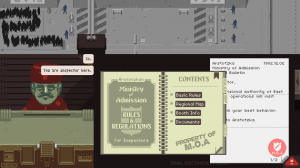 Gov. DiPrete dumpster-diving for his bribe, Mayor Cianci convicted for running a corrupt criminal enterprise, and a myriad of law enforcement agencies raiding Speaker Fox’s office. It’s easy for any of RI’s even casual political observers to rattle off a handful of dramatic events of convictions for or allegations of corruption. Among the exhortations to abolish the option to cast a vote for a single party (the “master lever”) was a suggestion that corrupt practices damage economic growth and that such practices would limit business growth in the state.
Gov. DiPrete dumpster-diving for his bribe, Mayor Cianci convicted for running a corrupt criminal enterprise, and a myriad of law enforcement agencies raiding Speaker Fox’s office. It’s easy for any of RI’s even casual political observers to rattle off a handful of dramatic events of convictions for or allegations of corruption. Among the exhortations to abolish the option to cast a vote for a single party (the “master lever”) was a suggestion that corrupt practices damage economic growth and that such practices would limit business growth in the state.
Color me skeptical. The problems of corruption tend to come when it overwhelms the reliability of basic government function. When it takes a greased palm to move services to act, this is a problem of corruption. When government is slow to act due to backlog or how it functions isn’t clear aren’t problems due corruption, but with bureaucracy and the unutterable phrase of a “too small budget.”
When marquee political names go down under a cloud of corruption, it sticks in the mind. So despite the inconclusiveness of various measures of political corruption in determining where Rhode Island ranks among states, we maintain a deep distrust of our government. And yet I’d gamble that only a small handful of Rhode Islanders have ever had to hand an official a bribe, and that if they have, there’s a high likelihood that official was charged with corruption at some point after.
I think that oftentimes we use “corruption” as a shorthand for all our frustrations with government and the political process. It is a word that encompasses our frustrations so well. It also makes it easier to prevent compromise. Facing an entrenched interest and a set of people who truly believe they are doing their best? Corruption. One cannot negotiate with corrupt forces; they must be utterly destroyed.
Thus when I see the usual suspects crowing over abolishing the master lever receiving a unanimously affirmative vote in the House as though it heralds the dawn of a new era I can do little but shake my head. Does anyone seriously think that removing a simple though confusing voting mechanism will really alter the balance of power in Rhode Island? Why is this energy not focused on better achievements, such as reducing the influence of money in our elections, fostering greater democratic participation, or even simply increasing the ability of constituents to access their representatives?
It’s far easier to focus on sideshows that don’t require much reflection about the government we truly want or require consensus-building. One thing the recent Gallup poll on trust in state governments noticed is that less-populous states are more trusting than more-populous states. I think that’s too simplistic; I think it is that more urbanized states are less trusting than less urbanized states. Rhode Island isn’t like other low-population states. As a highly-dense state population-wise, it’s virtually impossible for seriously corrupt practices to take place without the state’s media hearing of it. Contrast this with states where multiple small towns might be covered by a single reporter or news source and separated by vast geographical distances.
This also applies to the “you gotta know a guy” theory. That theory is brought up especially by people who do not, in fact, know a guy. Due to Rhode Island’s urbanized nature, the vast majority of people served by the state’s bureaucrats don’t know them. It’s a reasonably basic sociological principle that faceless bureaucracy breeds alienation; and undoubtedly Rhode Islanders feel alienated. Contrast that with a small town, where the local bureaucrat might be your childhood friend and knows everyone on sight. It’s much harder to feel alienated from them; it’s also far easier to forgive their transgressions.
But reducing alienation is not half as sexy an issue as “fighting corruption.” For one, it requires thoughtful investment in government and its employees; not a high priority for our fair-weather government reformers. And it offers none of the drama. No one is ever dragged out in handcuffs for alienating the citizenry. Target 12 and the I-Team don’t focus on callous government employees and process. “Bureaucratic processes confuse, frustrate citizenry” isn’t a Pulitzer-winning story.
To me, the hoopla over the master lever signals the lack of seriousness among so-called “leaders” for addressing problems within Rhode Island’s government. It’s a shallow issue for shallow people; up there with tossing loads of cash at 38 Studios (or any other corporation looking for a handout) or cutting taxes of the already-wealthy.
]]>
It was hard for me to work up the willingness to purchase Papers, Please, 3909 LLC’s game about a border checkpoint worker. $10 to check fictional paperwork? No thanks. But a string of good reviews kept my interest, so during the Labor Day weekend I coughed up the cash and set about learning how to stamp passports at the Grestin checkpoint between the fictional countries of Arstotska and Kolechia.
Papers, Please has appropriately been described as “bleak.” From the dull colors, to the pixelated artwork, to the plot and circumstances of the game (the war between Kolechia and your communist home country of Arstotska); Papers, Please is game that explores the darkness of the mundane. And yet, despite the interface which looks to repulse, it’s extraordinarily engrossing.
Dropped in without a tutorial or much instruction, it was up to me to figure out how to survive. The more people you process in the day, the greater your pay. But the faster you go, the more likely you are to make mistakes. And after a while, mistakes cost a lot. By about Day 3, I no longer had enough money to pay more than my rent; my poor performance at the checkpoint meant I had to forgo things like food and heat. Which meant my family fell sick. By the time I was able to earn enough money to pay for medication, my son had died from the combination of exposure, hunger, and illness. For the rest of the game, I was left with just my wife, mother-in-law, and uncle; until my sister died and I took in her niece.
Now, here’s what gets to me: for the rest of the game, I played as though my son’s death had had a serious impact on me, and changed the way I looked on my job; even though he was never more than a dot with the word “son” printed on it. I was more willing to bend rules. And I’d started to hit my stride as a passport inspector; able to adapt to the increasingly byzantine regulations my superiors were placing on immigration. I was also kind of a hard-ass, turning away journalists, detaining people (which thanks to a corrupt guard, earned me extra cash each time I did it, though I never detained anyone without a legitimate reason), refusing to let wives join their husbands due to expiration dates or printing errors.
The game ended for me when I assassinated a government agent sent to hunt down members of the resistance. This is one of 20 endings. At that point the government finally figured me out; though not before I’d assassinated another of their agents (with an incidental death of an innocent guard), and funneled multiple resistance agents into the country without proper documentation.
This is where it’s worth reflecting for me. Why did I, on my first play-through, make the choice to attempt to overthrow the government I was employed by? They once seized all my assets, true, but those were illegally gained by working for the resistance, and the government only got wise when I conspicuously spent them purchasing a new apartment (that money also allowed me to save my sick family). Perhaps it was the money the resistance compensated me with. Yet bribery never worked on me from anyone whose passport I checked. Or perhaps it was because Arstotska is presented as a totalitarian communist regime, and perhaps that’s why I wanted it overthrown, the natural default of Americans. Yet I never saw much of the oppression; I had almost zero information about what the regime was doing. Perhaps because I’m a romantic and a Rhode Islander, and rebels tend to have my sympathy. But the sad parade of people, who gave me more information about themselves than the resistance did, could hardly earn my hesitance before I stamped their passport.
Regardless of my reasoning, Papers, Please forced me to consider the following question in regard to bureaucrats: when do they get to decide to make the choice between what is legal and what is right? I did what I thought appropriate; help the resistance, but attempt to maintain a near-impeccable record elsewhere.
Small government advocates might think this game is a perfect way of demonstrating the overreach of government; but it’s not. It’s a great way of discussing bureaucracy; which isn’t intrinsic to government; but rather any large system. This game would work just as well were the setting a bank.
A moment that stands out to me was when a woman set a bomb on my desk and stood ready to die. It failed to go off, the guards detained her, and I eventually disarmed it, whereupon the corrupt guard sold it for scrap and gave a portion of the profit to me. I, personally, wasn’t the target. Arstotska was. But as a member of the bureaucracy, an employee of the government, I was a fine stand-in for Arstotska, even though I was sole breadwinner for four other people, and was just doing my job (to my estimation, none of the regulations ever seemed unreasonable, except for automatically strip-searching Kolechians, but that was stopped thanks to international pressure).
I was talking with a couple of former public employees recently, one of whom had recently left public service, and their outlook was that it was a relief to be out of government work. “It feels great to not be treated like I’m the scum on the bottom of someone’s boot,” said one, referring to the way we view our government workers in Rhode Island. It’s hard for us to separate the employee from the employer. Papers, Please forces us to consider that the bureaucrat in front of us is a human (in all its meanings), attempting to following complex rules, take care of their needs, and get through the day.
I’ve yet to play a game more relevant to our day-to-day lives.
]]>